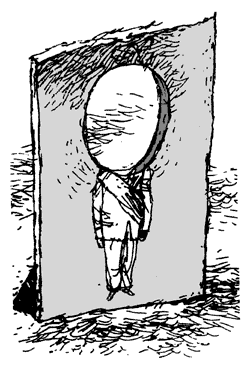 The culture of censure pervading the parties in parliament has brought Nepalis closer to our multi-layered cement of political solidarity. Considering the way ideology, geography, history and sheer personality hold sway over affairs of state, you have to acknowledge that organised politics is here to stay.
The culture of censure pervading the parties in parliament has brought Nepalis closer to our multi-layered cement of political solidarity. Considering the way ideology, geography, history and sheer personality hold sway over affairs of state, you have to acknowledge that organised politics is here to stay. When the main opposition CPN-UML formalised its self-cleansing campaign by reshuffling its representatives on the major parliamentary committees a few weeks ago, the comrades acted to preserve the ideological uniformity of their entity. The imperative of collective responsibility dictated that the party throw its weight behind former tourism minister Bhim Rawal, accused of irregularities by the UML-headed House of Representatives Public Accounts Committee in the lease of a China South-West aircraft. After an internal audit of the UML's coffers failed to establish that China South West had made any significant contribution to the party's financial health, the case for collective responsibility was dismissed. Since responsibility is indivisible in the UML, Rawal was automatically exonerated. The fact that last year's UML-led Lauda brouhaha was based on a report prepared by the same panel was no longer relevant. If committee members could wrongly fault Rawal, they must have used flawed methods in implicating then-prime minister Girija Prasad Koirala as well. For the UML, at least, the files on the Lauda and China South West scandals were closed together.
The discipline drive in the Nepali Congress has turned into nasty personal brawls lately. This is perhaps understandable in a party whose democratic credentials remains unrivalled even after having accepted responsibility for so many of the deficiencies and distortions of the last 12 years. The latest bout of bickering has nevertheless raised ominous questions. Weeks after reproaching Dhundi Raj Shastri and three other party members for having called on the palace to become more actively involved in protecting the constitution, the party's overtly pro-Koirala disciplinary committee cracked the whip on Minister for Information and Communication Jaya Prakash Prasad Gupta for appearing to defend the army chief's fiery convocation speech. Going through the press coverage of Gupta's comments, you can't figure out whether he was seconding the army chief's indictment of 12 years of (dis)organised politics or was merely exhorting us to evaluate why chief sahab got so worked up. But the disciplinary panel found enough traces of endorsement to recommend Gupta's suspension from the party's primary membership for a year. That move did more to unite Prime Minister Sher Bahadur Deuba's cabinet than a simultaneous induction of three deputy prime ministers could have.
The stand-off also served to reaffirm the strong political influence regionalism has acquired since Nepali Congress MPs west of Karnali River were outraged by the way Nepal Rastra Bank Governor Tilak Rawal was being pushed around. Gupta's suspension sparked thinly-veiled complaints of collective punishment from a dozen Kangresi MPs representing the tarai. When Saptari's Gupta happened to follow Sunsari's Bijay Kumar Gachhedar into the flogging chamber, it no longer mattered that the man who wielded the stick, Mahanth Thakur, represents Sarlahi. This assertion of southern solidarity could have more far-reaching consequences for national politics than the uproar triggered by Prime Minister Deuba's decision last year to lower the land ownership ceiling. For one thing, tarai-based MPs of the ruling party have widened their concerns from matters of property to those of propriety. Moreover, the 12 signatories to last week's statement have surnames with deeper roots in the alluvial soil of the plains than, say, Mahesh Acharya's or Ananda Prasad Dhungana's.
History seems to be haunting the Rastriya Prajatantra Party. The leadership is pondering what to do with those central committee members who got a bit nostalgic about the panchayat days at an informal gathering a few weeks ago. From the newspaper photographs of RPP president Surya Bahadur Thapa flanked by Prakash Chandra Lohani and Pashupati Sumshere JB Rana at the emergency meeting convened to weigh the fallout from that petition to the palace, it was easy to forget the acrimony that surrounded Nepal's first successful no-confidence vote in 1983. But it would be a grave mistake to dismiss dissension in the ex-panchas' ranks as ephemeral. Remember, these nine central committee members are waiting for the hammer to fall so that they can bolster their case for the creation of a new janjati party.
On the far left of the legislative spectrum, the United People's Front and National People's Front have come in for criticism from their parent organisations. The NPF's Chitra Bahadur KC drew fire from the CPN-Masal for having signed the all-party political mobilisation accord without consulting his comrades. Lila Mani Pokharel of the UPF-a wholly-owned subsidiary of the CPN-Unity Centre-was chastised for his scathing criticism of the order relaxing emergency restrictions. The Unity Centre considered Pokharel's tirade an indirect assault on the all-party agreement signed at the Balkhu conclave.
The Nepal Sadbhavana Party is still mourning the death of founding father Gajendra Narayan Singh, so the inside story surrounding Badri Prasad Mandal's elevation as acting president remains to be told in public. This leaves us with Narayan Man Bijukchhe. Since the leader of Nepal Workers and Peasants Party is his organisation's sole representative in parliament, charges of his violating party discipline become harder to probe.
Political disarray in Nepal has invariably opened the door to foreign governments seeking to pursue their objectives here. This time, Bhutan seems to have detected a window of opportunity. Thimpu, which just played host to former foreign minister Chakra Prasad Bastola-a leading Kangresi contender to replace Prime Minister Deuba-has invited a UML delegation led by former deputy premier Madhav Kumar Nepal.


